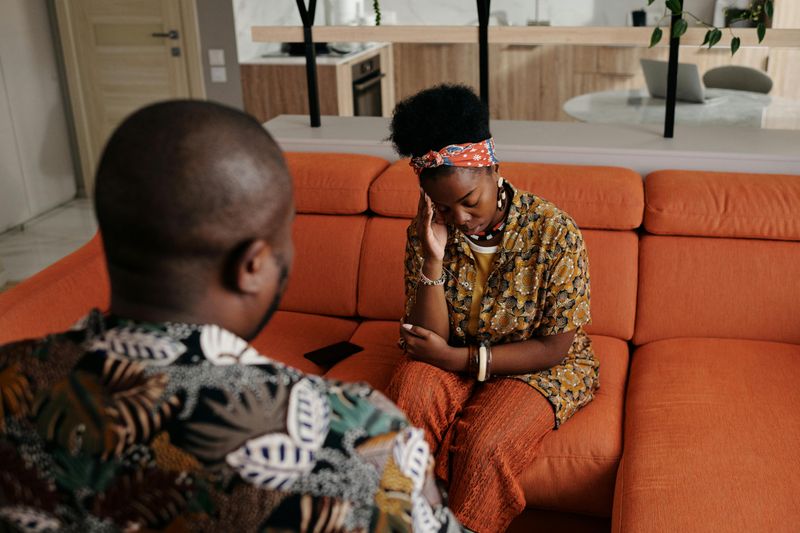18 Toxic Behaviors in Relationships That Aren’t True Love

Relationships should lift us up, not tear us down. Unfortunately, many people mistake controlling, manipulative, or hurtful behaviors for love. These toxic patterns can damage our self-worth and prevent genuine connection. Understanding the difference between true love and harmful behavior is essential for building healthy relationships that actually help us grow.
1. Smothering in the name of closeness

Your partner constantly texts, calls, and demands to know your whereabouts. They claim they just miss you or worry about you, but their behavior leaves you feeling suffocated rather than cherished.
Personal space isn’t just a luxury—it’s a necessity for healthy relationships. When someone monitors your every move or gets upset when you spend time with others, they’re not showing love but attempting to control you.
True love respects independence and understands that both people need room to grow as individuals. A partner who truly cares will encourage your separate interests and friendships, not try to eliminate them.
2. Keeping score of favors or past hurts

“Remember when I did that for you three months ago?” Score-keeping turns relationships into transactional battlegrounds where kindness comes with strings attached. This behavior creates an environment where neither person feels safe to be vulnerable.
Love doesn’t maintain a ledger of debts and credits. When someone constantly reminds you of their sacrifices or brings up your past mistakes during arguments, they’re weaponizing history instead of working toward solutions.
Healthy relationships focus on understanding and moving forward together. Partners who truly love each other extend grace freely, without mentally logging every good deed for future leverage.
3. Control disguised as concern

“I don’t want you wearing that because other people will get the wrong idea.” Sound familiar? This subtle form of control masquerades as care while actually undermining your autonomy.
When someone dictates your clothing choices, criticizes your friends, or questions your decisions under the guise of “looking out for you,” they’re actually establishing dominance. Their behavior suggests they don’t trust your judgment or respect your ability to make choices.
Genuine concern empowers rather than restricts. A loving partner might express worries but ultimately respects your decisions and supports your right to live according to your own values and preferences.
4. Silent treatment as punishment

The cold shoulder, ignored texts, and refusal to speak create an atmosphere of walking on eggshells. This emotional withdrawal isn’t just childish—it’s a form of psychological punishment designed to make you suffer until you apologize or give in.
Communication is the lifeblood of healthy relationships. When someone deliberately cuts it off to hurt you or gain the upper hand, they’re choosing manipulation over problem-solving.
Partners who truly love each other might need space sometimes, but they communicate this need respectfully. They don’t disappear or freeze you out to teach you a lesson or make you chase after them.
5. Assuming mind-reading is intimacy

“If you really loved me, you’d know what I want without me having to tell you.” This unrealistic expectation sets relationships up for disappointment and resentment. Nobody—not even the most attentive partner—can read minds.
True intimacy develops through open communication, not telepathy. When someone expects you to anticipate their needs without clear expression, they’re creating impossible standards that you’ll inevitably fail to meet.
Loving relationships thrive on honest conversations about desires and needs. Partners who care about each other speak up kindly and listen carefully, understanding that clear expression strengthens connection rather than diminishing romance.
6. Sacrifice as a contest

Martyrdom doesn’t equal love. When relationships become competitions about who sacrifices more, both people lose. “I gave up everything for you” becomes a guilt-inducing weapon rather than an expression of caring.
Healthy sacrifice comes from genuine desire to support your partner’s wellbeing, not from obligation or to earn relationship points. It should feel freely given, not demanded or expected.
True love involves mutual give-and-take where neither person keeps track or expects payback. Both partners contribute because they want to, not because they feel pressured to prove their devotion through increasingly dramatic displays of self-denial.
7. Lacking personal boundaries

“We’re one person now, so privacy doesn’t matter.” Yikes! Sharing passwords, expecting constant availability, and merging identities completely isn’t romantic—it’s boundary violation disguised as closeness.
Healthy relationships require healthy boundaries. When someone pressures you to abandon your personal limits or makes you feel guilty for having them, they’re undermining the very foundation needed for lasting love.
Partners who truly care respect each other’s physical, emotional, and digital boundaries. They understand that maintaining individual identity actually strengthens the relationship rather than threatening it. Love thrives in the space between two whole people, not in the complete absorption of one by another.
8. Dismissing your partner’s feelings

“You’re overreacting” or “You’re too sensitive” are phrases that invalidate emotions and shut down honest communication. Belittling your partner’s feelings creates deep wounds that undermine trust and emotional safety.
Everyone deserves to have their emotions acknowledged, even when their partner doesn’t understand or agree with them. Dismissal tells someone their inner experience doesn’t matter.
Loving partners make space for each other’s feelings without judgment. They listen with empathy, seek to understand perspectives different from their own, and validate emotions even during disagreements. This emotional respect forms the foundation for true intimacy and connection.
9. Equating drama with passion

Constant fighting followed by intense makeups isn’t passionate—it’s exhausting. The rollercoaster of extreme highs and lows might feel exciting initially but eventually damages emotional wellbeing and trust.
Hollywood has convinced many people that relationship drama equals deep love. In reality, stable, consistent care creates much stronger bonds than the adrenaline rush of conflict and reconciliation.
Truly passionate relationships don’t need chaos to feel alive. They find excitement in growing together, supporting each other’s dreams, and building deeper connection through positive experiences. The steadiness of reliable love provides security that allows genuine passion to flourish.
10. Overdependence

“I can’t live without you” sounds romantic in movies but signals trouble in real life. When someone makes you their entire world, the weight of being their sole source of happiness becomes crushing.
Healthy relationships involve interdependence, not complete dependence. Each person maintains their own support network, interests, and sense of self while choosing to build a life together.
True love encourages growth and resilience rather than fostering helplessness. A partner who truly cares wants you to thrive independently as well as together, understanding that two strong individuals create a stronger relationship than two people who can’t function separately.
11. Forgiving everything, even intolerable behavior

Endless forgiveness without change isn’t virtuous—it’s dangerous. When someone repeatedly hurts you, apologizes without changing behavior, and expects unlimited chances, they’re exploiting your compassion rather than valuing it.
Setting healthy limits on what you’ll accept doesn’t mean you don’t love someone. It means you love yourself enough to require respectful treatment.
True forgiveness in healthy relationships involves accountability and growth. Both partners take responsibility for their actions, make genuine efforts to change harmful patterns, and respect each other’s boundaries. Love that asks you to endlessly tolerate mistreatment isn’t love at all.
12. Possessiveness mistaken for loyalty

“You belong to me” might sound romantic in old love songs, but in real life, it’s concerning. Treating your partner as property—monitoring their friendships, demanding access to their devices, or becoming angry when others appreciate them—reveals insecurity, not devotion.
Nobody owns another person. Healthy loyalty grows from mutual trust and respect, not from restrictions or surveillance.
Partners who truly love each other feel proud when others recognize their loved one’s qualities. They understand that choosing each other daily through free will creates a much stronger bond than possession ever could. Real loyalty doesn’t need to be enforced—it’s given willingly.
13. Using “I love you” to excuse bad behavior

“I only acted that way because I love you so much.” These words attempt to transform harmful actions into expressions of care, creating confusion about what love actually means. Love becomes the ultimate get-out-of-jail-free card.
Genuine love doesn’t hurt, control, or manipulate. When someone uses their feelings as justification for treating you poorly, they’re distorting love’s meaning to avoid taking responsibility.
In healthy relationships, “I love you” isn’t weaponized or used as a shield against accountability. True love manifests through consistent respect, kindness, and consideration—not as an excuse for behavior that causes pain.
14. Obsessive jealousy & control misread as affection

“I get jealous because I care so much.” This dangerous misinterpretation confuses possessiveness with love. Checking your phone, questioning your every move, or becoming upset when you interact with others isn’t romantic—it’s controlling.
Jealousy in small doses might be natural, but when it drives behavior that restricts your freedom or isolates you from others, it becomes toxic. Someone monitoring your life isn’t showing how much they love you; they’re showing how little they trust you.
Secure love doesn’t need constant reassurance or surveillance. It’s built on mutual respect, trust, and the understanding that choosing each other freely creates a stronger bond than any form of control ever could.
15. Love bombing

Excessive flattery, over-the-top gifts, and declarations of undying love after just meeting might seem like a fairy tale beginning. Be cautious! This overwhelming attention often serves as the first stage in a cycle of manipulation.
Love bombers shower you with affection and make grand promises early on, creating an intense emotional connection before you’ve had time to evaluate the relationship realistically. Once they’ve secured your attachment, the excessive attention typically fades or becomes conditional.
Healthy love develops gradually through consistent actions over time. It doesn’t rush intimacy or try to fast-forward through relationship stages. Real connection builds slowly on a foundation of trust, not through whirlwind intensity designed to overwhelm your defenses.
16. Gaslighting

“That never happened. You’re imagining things.” Gaslighting makes you question your own reality, memories, and perceptions. This insidious form of manipulation causes victims to doubt themselves rather than the person harming them.
When someone consistently denies your experiences, twists facts, or claims you’re “too sensitive” when you express hurt, they’re attempting to control the narrative rather than address real issues. Over time, this erodes your confidence and independence.
Loving relationships are built on honesty and mutual reality. Partners who truly care about each other validate experiences even during disagreements, seeking understanding rather than trying to convince the other person their perception is wrong.
17. Criticism, contempt, defensiveness, and stonewalling

Relationship expert John Gottman calls these the “Four Horsemen” because they predict relationship apocalypse. Constant criticism attacks your character rather than addressing specific behaviors. Contempt conveys disgust through eye-rolling, mockery, or sarcasm.
Defensiveness deflects responsibility, while stonewalling shuts down communication entirely. Together, these behaviors create a toxic environment where problems can’t be resolved and connection withers.
Healthy relationships replace these patterns with gentle start-ups, appreciation, accountability, and self-soothing. Partners who truly care for each other discuss issues respectfully, express admiration regularly, take responsibility for mistakes, and communicate needs clearly—even during difficult conversations.
18. Emotional manipulation

Guilt trips, threats of self-harm, or sudden emotional meltdowns when things don’t go their way—these tactics hold your emotions hostage. “If you really loved me, you would…” becomes a control mechanism rather than genuine communication.
Manipulators exploit your compassion and fear to get what they want. They may switch between victim and aggressor roles, making you feel responsible for their happiness while punishing you for perceived slights.
True love doesn’t use emotions as weapons or leverage. Healthy partners express feelings honestly without using them to control outcomes. They take responsibility for their own emotional wellbeing while remaining considerate of yours.

Comments
Loading…